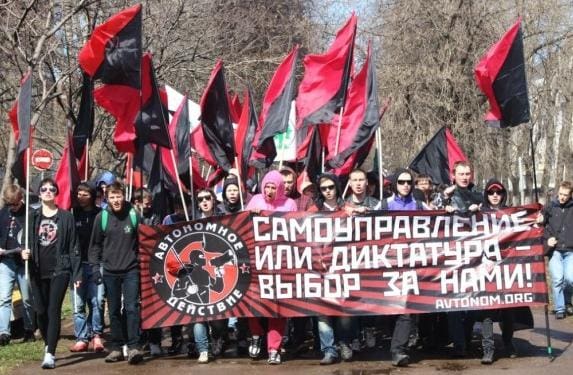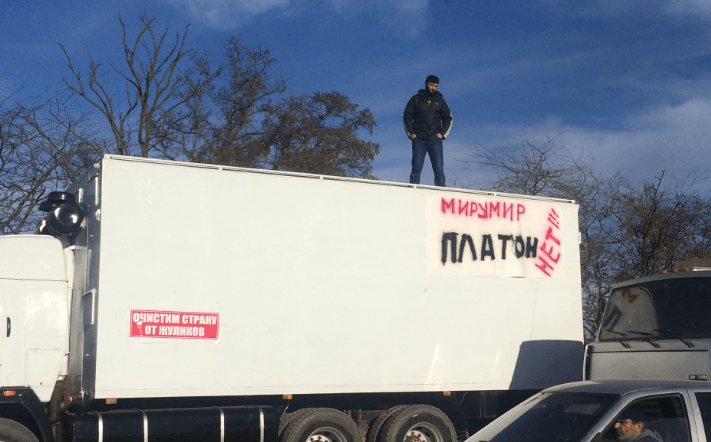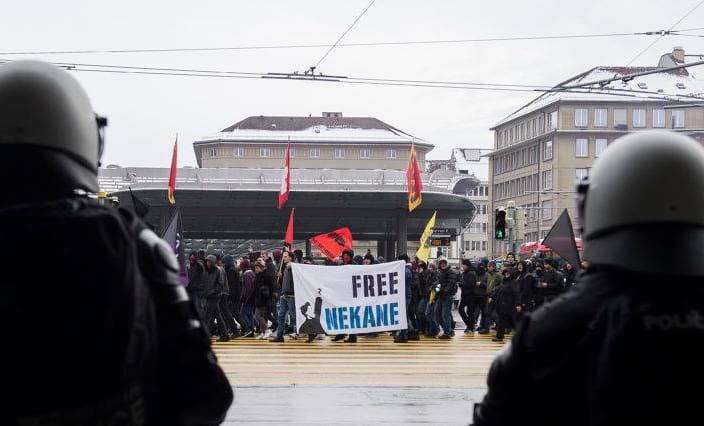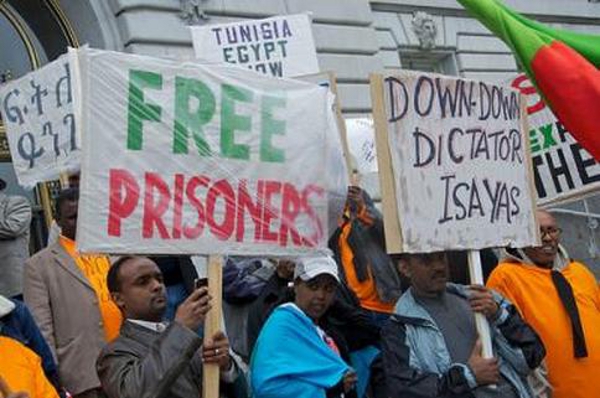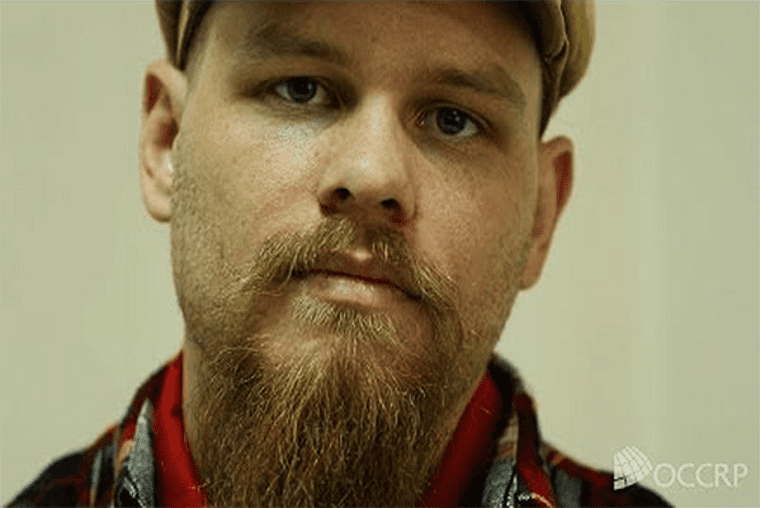
Dmitry Buchenkov, PhD in political sciences, antifascist, anarchist and boxing coach, has been in custody for already more than three months in “Vodnik” remand prison. Investigators suspect him of participating in the riots of May 6, 2012 at Bolotnaya Square in Moscow. The absurdity of the accusation against Dmitry Buchenkov is quite evident: he had been in Nizhny Novgorod on that day, more than 300 km away from Moscow, but he was arrested anyway despite the alibi.
Dmitry Buchenkov, 36, born in Nizhny Novgorod, lecturer of history and political science, PhD in political science, associate professor, worked as Deputy Chairman of the Medical History and Socio-Humanitarian Science Department in the Russian National Research Medical University named after N.I.Pirogov in Moscow.
Dmitry has been a member of the anarchist organization Autonomous Action since 2002. This is how the he describes the ideology he shares in a book entitled Anarchists in the Late Twentieth Century in Russia published in 2009: “Basic worldview values of anarchism (self-management, self-organisation, anticapitalism) are still relevant today.”
Dmitry actively participated in organizing efforts and the life of the antifascist and anarchist movements in Moscow. He organized many antifascist street protest actions and different cultural events. He took part in the establishment of an antifascist center called “V Project,” where antifascists and anarchists held their gigs and meetings and prepared their actions. Police and FSB threatened to attack Dmitry physically for his political activities more than once.
Dmitry Buchenkov had planned to organize an all-Russian antifascist and anarchist forum, “Self-management and Libertarian Communism,” in early 2016, but he was arrested. On December 2, 2015, early in the morning, police searched both apartments where Dmitry could have been: an apartment where he lived in Moscow with his girlfriend Anya and her child, and his parents’ place in Nizhny Novgorod.
The parents weren’t told anything about his arrest. They learned about his arrest only afterwards from mass media. Buchenkov’s girlfriend said he was not allowed to make a phone call or told the official investigator’s name.
The Central Investigative Department of the Investigative Committee of Russia accused Buchenkov of the following: participation in civil disorder (art. 212 of the Criminal Code of Russia) and acts of violence against representatives of state authorities (art. 318 of the Criminal Code of Russia) during clashes at Bolotnaya Square on May 6, 2012. On December 3, 2015, Buchenkov was brought to court and sent to a remand prison as a result of the hearings.
In the end of January 2016 the term of Dmitry Buschenkov’s detention was extended to June 2016.
How do you spend your day in prison?
It’s like “groundhog’s day.” Wake up, breakfast, investigative actions, open air, lunch, investigative actions, open air, dinner…Everything in accordance with the schedule, which is tiresome, but there is some time for rest. I am usually reading when I have spare time. I have not read any fiction for the last six years, and here I’ve read five books already. Of course I am lacking scientific literature. I could have written my second dissertation while I’m in.
When it’s open air time I am trying to remember all the exercises I used to do although I don’t manage to do all of them as there is no gym equipment. Nevertheless, one can keep fit here. All in all, I’m OK. I fell ill a little in January, when I had to participate in “investigative actions,” but now I’m much better.
Getting ill in prison is very unlucky, I would not wish it on anyone. You would not get any medical aid, so it’s best to stay in good health.
How difficult are conditions in the remand prison?
Can’t say much about conditions, as everything is censored here. I can only say that I’m behaving myself in order to maintain basic human relations. I don’t eat as well as in a restaurant here, but prison food is OK, it feeds you well. However, surviving solely on prison food would be hard, so I’m very grateful to people who help by sending me parcels – this is very important and actually helpful.

We don’t have access to information in the cell, no press, and TV shows are only state channels; we also have this horrible Russian Radio – a real shame to Russian culture. We are getting only very little news about what is happening outside.
Massive propaganda on television is driving me nuts. Russian media are dispersing thinly veiled fascist and xenophobic sentiments. TV presenters saying stuff like “tolerant Europe is suffocating, migrants kill and rape women, the European value system has crashed,” and can’t even hide their jeering. They state triumphantly: “This is what we warned about, Europe is about to fall, while in Russia even Amur the tiger and Timur the goat live in peace.”
The ruling class controlling the media is pursuing its anti-European agenda in its propaganda. Growing patriotism is very important in conditions of crisis. At the same time many representatives of the ruling class, their relatives have double citizenship, European and American passports.
The main message is quite simple. Our population should believe that “everything is good in Russia, while everything is bad in Europe.” It doesn’t matter that the living standards are higher in Europe than in Russia. This is reflected in objective sociological surveys. The propaganda is primitive, simplistic and deceitful.
For many, your case is an example of absurdity. How do you live through it?
It’s only when you are outside that my case looks so absurd: “an innocent man imprisoned.” In reality, for our country my case is rather logical. Moreover, it’s a part of common practice. Everything that happened to me has only convinced me even more that I chose the right way and that my convictions are correct.
In such a situation one should not just wait for release, one should live one’s life in prison. Can’t do it otherwise. Staying inside, I realize that it’s not about me. The problem is the entire system to which nothing can be opposed so far.
Did you know that you could be arrested or was the visit from police agents a total surprise?
I did not know I would be arrested, but I supposed that it was possible. Around one year before my arrest I started dreaming about the so-called “law enforcement authorities” in my sleep. Perhaps I should have paid attention to my insight, my subconscious.

I knew that logically they could not lock me in remand prison, I was innocent and I was not present at Bolotnaya Square on May 6, 2012, and police knew it. Social experience and political knowledge were telling me that I would be imprisoned against all logic. Fist I was pissed off with their atrocious insolence, but then I got used to it.
I acquired one very important thing inside — a profound hatred against the modern state system and class society. This is an extremely useful acquisition for a revolutionary. I want to say, I did feel something like that before, but it was purely logical.
Now it’s a profound living emotion. I’d like to thank the Investigative Committee and police for this opportunity; they’ve turned me into a completely convinced revolutionary.
I was lacking but this small detail – prison, where all strata of Russian society are represented, from hopeless junkies to big business figures. You can’t make that many social observations in your everyday life in such a brief period outside.
What’s the reason for your arrest, do you reckon?
It’s not the Bolotnaya riots. I was not there. I think there are a number of reasons that brought about my arrest: it is the high probability of civil unrest around Russia in the next couple of years due to political and economic crises; the forthcoming parliamentary elections; the complicated foreign relations post-Ukraine 2014.
My staying locked in the remand prison — it’s pure politics. What are the prospects of this process? It is highly likely that I will get a sentence on this absurd case and will be sent on to a penitentiary camp. This whole case is crazy, it’s fabricated and falsified, and nobody cares, nobody gives a damn. This is our judicial system and our state in general. An absolutely innocent person can get an absurd sentence and have to do real time in prison; this is the essence of the Putinist Russia.
I was arrested for my political convictions, for my political activities. For organizing demos, for participating in founding the V Project antifascist center. For organizing and coordinating antifascist and anarchist activities in Moscow. I am sure of that. The authorities are trying to purge the left wing, anarchists, and antifascists via police and the Investigative Committee. In the last few years we have been under a steamroller of repression; there are so many criminal cases filed, so many militants arrested, some had to leave the country.
A big number of anarchists and antifascists passed through the Bolotnaya case, some of them are still locked up by the Putin regime: Alexei Gaskarov and Andrei Barabanov are doing time in camps. Well-known left activists Sergey Udaltsov and Leonid Razvozjayev are still imprisoned as well.
Many antifascists and anarchists are in prison on various falsified accusations. Constant pressure is exerted on Alexei Sutuga by his camp administration – he was locked in a solitary confinement cell for refusing to collaborate with the administration. Alexander Kolchenko got a monstrously long sentence – ten years – for arson in a reception room of the “United Russia” party. Ilya Romanov was sentenced to ten years in a falsified case on terrorism, and it happened soon after his release from prison, where he had spent a previous ten years in another case.
Yegor Alekseyev is being persecuted in Tomsk for his political activities – he was accused as per art. 282, used by the authorities to suppress dissent.
Do you discuss politics with your cell mates? How do they react?
Yes, sometimes we share ideas on what’s happening in the country and in the world. People are mainly critical towards the modern Russian authorities, because they have felt its humaneness and justness on their own skin.

I do try to talk more to prisoners, respond to people who are writing to me – correspondence is very important and it embellishes a prisoner’s life a little.
I am very glad when I receive letters from friends and strangers alike; it supports you and doesn’t let you break down. For any prisoner, news from outside is like a gulp of fresh water in the midst of the Sahara, that’s why I’m asking all who want to help political prisoners: do write letters, it takes only a little time and anybody can do it, while it keeps warmth in a prisoner’s heart. I want to thank everyone for their support.
AntiNote: This inteview appeared online on Avtonom.org on 13 April 2016. The interview was conducted by Oleg Volin.

